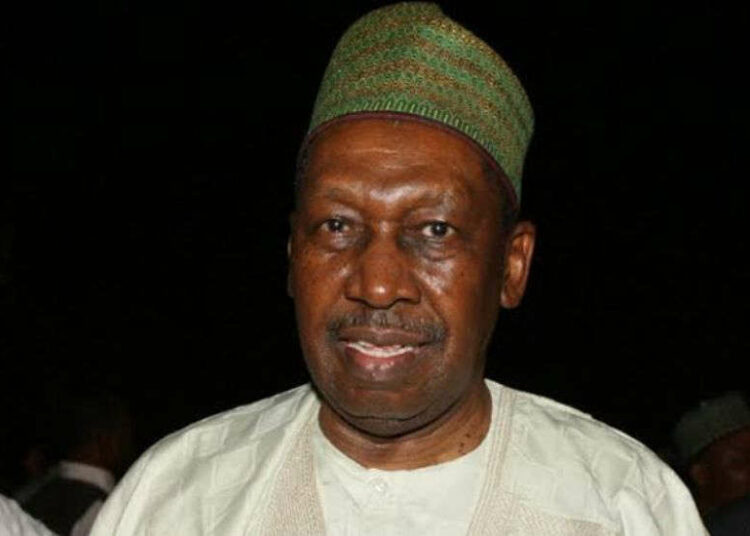The death of Justice Mohammed Lawal Uwais on June 6, 2025, at the age of 88, closes a monumental chapter in Nigeria’s legal and democratic journey.
Coming on the day of Eid-el-Kabir, his passing carries symbolic weight – signifying the quiet departure of a jurist who served his country with uncommon integrity, intellectual depth, and a deep devotion to justice.
Born in Zaria on June 12, 1936, Uwais embodied the finest qualities of public service. From his early days at Tudun Wada Elementary School through his studies at Barewa College, and then at Ahmadu Bello University (ABU), Zaria and the School of Oriental and African Studies in the United Kingdom (UK), Uwais’ life was one of learning and preparation for service.
Called to the English bar in 1963 and to the Nigerian bar a year later, he began his legal career as a private practitioner before joining the Ministry of Justice in Northern Nigeria, eventually rising to become a solicitor-general and a permanent secretary.
His judicial ascent was steady and based purely on merit. From high court judge to Court of Appeal and, in 1979, to the Supreme Court, Uwais rose to become the Chief Justice of Nigeria (CJN) in 1995, a position he held until 2006. During that period, he oversaw the judiciary’s transition into the Fourth Republic, a time of political turbulence and institutional restructuring.
Among his most enduring legacies is the establishment of the National Judicial Council (NJC) in 1999, which remains the cornerstone of judicial discipline and appointment in Nigeria. In a system vulnerable to political capture, the NJC was designed to insulate the judiciary from undue influence. By creating a professional body to oversee the career path of judges, Uwais strengthened judicial independence and accountability.
Equally notable were his landmark rulings, many of which fortified electoral jurisprudence in Nigeria. One such case challenged the powers of the Independent National Electoral Commission (INEC), with Uwais’ opinion reinforcing transparency and autonomy within Nigeria’s electoral system.
At a time when elections were marred by violence and fraud, he used his position to advance the rule of law and uphold citizens’ democratic rights.
Yet Uwais’ service to Nigeria did not end with his retirement. In 2007, then President Umaru Musa Yar’Adua appointed him to head the Electoral Reform Committee. The resulting Uwais Report was a masterclass in electoral reform, offering bold proposals aimed at insulating INEC from executive interference.
It recommended that the appointment of INEC chair and commissioners be handled by the NJC, subject to Senate confirmation, rather than by the President. It also proposed the unbundling of INEC’s powers, introduction of electronic voting and result transmission, and independent candidacy.
The report was greeted with enthusiasm by reform-minded Nigerians and civil society, but was met with fierce resistance by the political elite. While parts of the recommendations were eventually adopted, many of its most transformative elements remain shelved. Yet, Uwais never wavered in his belief that credible elections were the bedrock of a functional democracy. Until his last years, he continued to speak out on the importance of reform, justice, and institutional integrity.
His critics argued that the judiciary under his watch could have done more to confront internal corruption. Delays in handling judicial misconduct and allegations of case-fixing tainted public confidence in the Bench. But even his detractors acknowledged that Uwais stood above the fray, consistently advocating transparency within the legal system and holding judges to high ethical standards.
Following his death, tributes poured in from across the country. President Bola Tinubu described him as a “phenomenal jurist and statesman” whose stabilising role in the judiciary helped consolidate Nigeria’s current democracy.
Chief Justice of Nigeria (CJN) Kudirat Kekere-Ekun called him “a beacon of principle and a guardian of judicial honour.” The Supreme Court, where he served for 27 years, remembered him as a tireless reformer. Others, including senior advocates, governors, and civil society leaders, spoke of a man who mentored generations, reformed the Bench, and led by example.
Yet, it would be remiss to turn his death into mere nostalgia. Justice Uwais leaves behind a challenge: Will Nigeria’s judiciary continue the path of independence and credibility he fought for? Or will his ideals be buried with him?
In recent years, the judiciary has been rocked by accusations of partisanship, contradictory rulings, and delayed justice. The National Judicial Council (NJC) he established remains structurally sound, but its effectiveness has been questioned depending on the occupant of the CJN’s chair.
If Nigeria is to honour Uwais’ legacy meaningfully, it must go beyond glowing tributes and resume the conversation he started. The Uwais Report should not remain a document gathering dust in the archives.
The National Assembly must revive its key proposals – particularly on INEC’s autonomy and electoral transparency.
As a newspaper, we join in mourning his death but more importantly, we call for his life’s work to be preserved, studied, and institutionalised. Nigeria can ill afford to forget men like Justice Uwais. In a country yearning for accountability, transparency, and rule of law, his legacy is not just relevant – it is essential.





